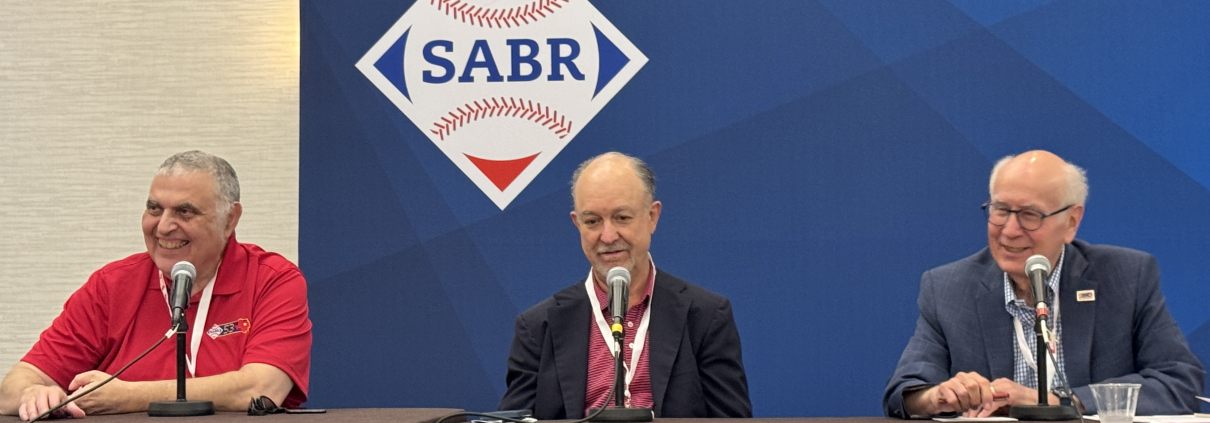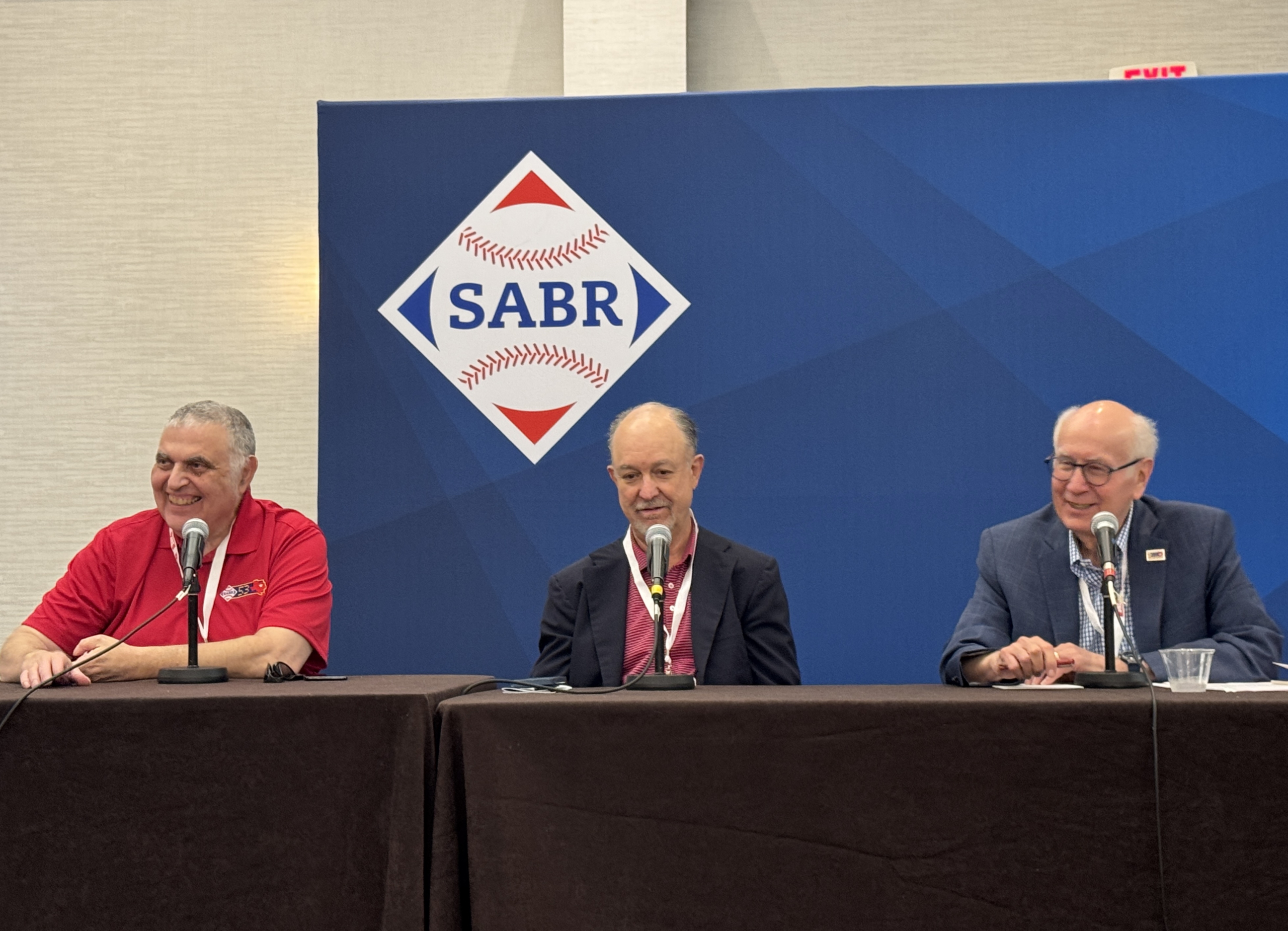SABR 53: Listen to highlights from the Beckett Baseball Cards Panel with Dr. James Beckett, Rich Klein, and Paul Rogers
On Saturday, June 28, 2025, the Beckett Baseball Cards Panel was held at SABR 53 at the Westin DFW Airport Hotel in Irving, Texas.
Panelists included Dr. James Beckett, founder and publisher of Beckett Publications, which grew into the largest sports and entertainment collectibles publisher in the world, and a recipient of SABR’s Jefferson Burdick Award; and Rich Klein, a SABR member since 1985 and a sports card identification specialist for COMC. Klein also spent nearly two decades working as a price guide editor for Beckett Media. The moderator was C. Paul Rogers III, president of SABR’s local Banks-Bragan DFW Chapter.
- Audio: Click here to listen to the SABR 53 Beckett Baseball Cards Panel (1:00:35; MP3)
Here are some highlights:
ON HAVING THE ‘COLLECTOR’ GENE
- Beckett: “I pity the people who collect nothing. … It was a socializing experience to have the cards, to trade the cards. When you spend a lot of time with a person or a thing, you get attached. And then there’s this problem that every year there’s new cards. So over time, you get very attached to a card or some cards … and for me it was all cards. I never really thought I’d work in the industry or work in sports. But I loved sports. I think I always saw it as a hobby and my hobby turned it into a business. Now you might say if your hobby turns into a business, you need a new hobby. No! I thought, ‘I’m going to keep it as a hobby and keep it as a business.’ And then when I sold my business, I went back to being a hobbyist. And it’s more fun being a hobbyist than being in business.”
ON THE IMPACT OF DAN DISCHLEY
- Beckett: “Dan was one of the founding fathers of SABR. He was a good friend of Rich and mine. I was a subscriber to The Trader Speaks. It was a hobby publication that he put out, but it had some SABR influence in it.”
- Klein: “I once bought a collection that had all of the The Trader Speaks, so I actually read all of them while compiling information for the almanacs. For the first three or four years of his publication, it was amazing how intertwined the idea of baseball research was with the publication. … There were only 16 founding members in 1971 in Cooperstown. The Bob Davids Award is named after the person who got that motley crew together. And we thank him for it.”
ON FOUNDING BECKETT PUBLICATIONS AND THE PRICE GUIDE
- Beckett: “I think it was audacious. I sought counsel from people who unanimously said I was crazy, it can’t be done. But I knew I could do it. The audacity was really (in) trying to be comprehensive. There were other people who were trying to get a handle on what certain cards were selling for. But I thought this hobby will never get to the next level until every card has a price, in different conditions. And there would be full understanding of the supply and demand in a hobby that had increasingly huge numbers that skewed (the prices). In those days, it was still very, very difficult. But I was a very active dealer, so I had a base of knowledge. I had good relationships with dealers and collectors around the country. I was hitting the big shows. And so I just jumped in. It took a year to get the first one, and then after you’re updating something. So the first one was my big contribution, getting something out there. There’s a lot of people who think about things and get started on things, but I said I’m going to finish it. And after I finished it, I realized I had a tiger by the tail. This was going to be an annual production. It was a labor of love, and it started out with an emphasis on love and then it became an emphasis on labor.”
ON THE PROCESS OF CATALOGUING CARDS
- Beckett: “Part of what we were doing was not just the price guide, it was the cataloguing aspect, which really ties in with SABR. We were cataloguing all these sets, mainly major league baseball but (also) minor leagues and other obscure subjects. And you can’t price something if you don’t know what it is or who it is. We leaned heavily and had quite a bit of overlap with SABR and the biographical aspects of it. Rich was masterful. He really took the cataloguing aspects to the next level, because he had access to all of you and the work there. If you don’t know the players and the game, then you don’t know if the price reporting you get is an anomaly, an error, a mistake, a mistaken identity. But if you do know all those things, then you can say this is not an outlier, we can bring order out of the chaos of all these cards. If we did it right, then people could look them up and they could have confidence that the dealer and the collector could get a fair deal and they could meet in the middle.”
- Klein: “Knowing who the players are, knowing the differences in the game — you have to know that the 1960s were pitching-dominated and the 1990s were hitting-dominated, and you have to make certain adjustments for that. Numbers still matter, but how good is the player? When you do baseball research, you learn the game. And when you learn the game, you learn the cards. And when you learn the cards, you’ve learned everything.”
For more coverage of SABR 53, visit SABR.org/convention.
Originally published: July 16, 2025. Last Updated: July 16, 2025.




